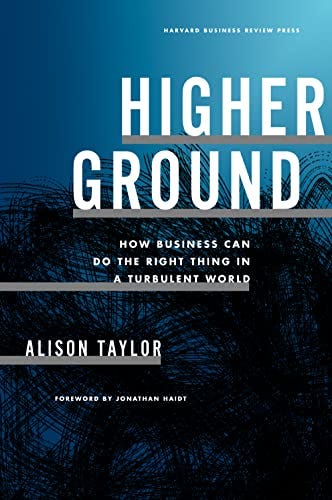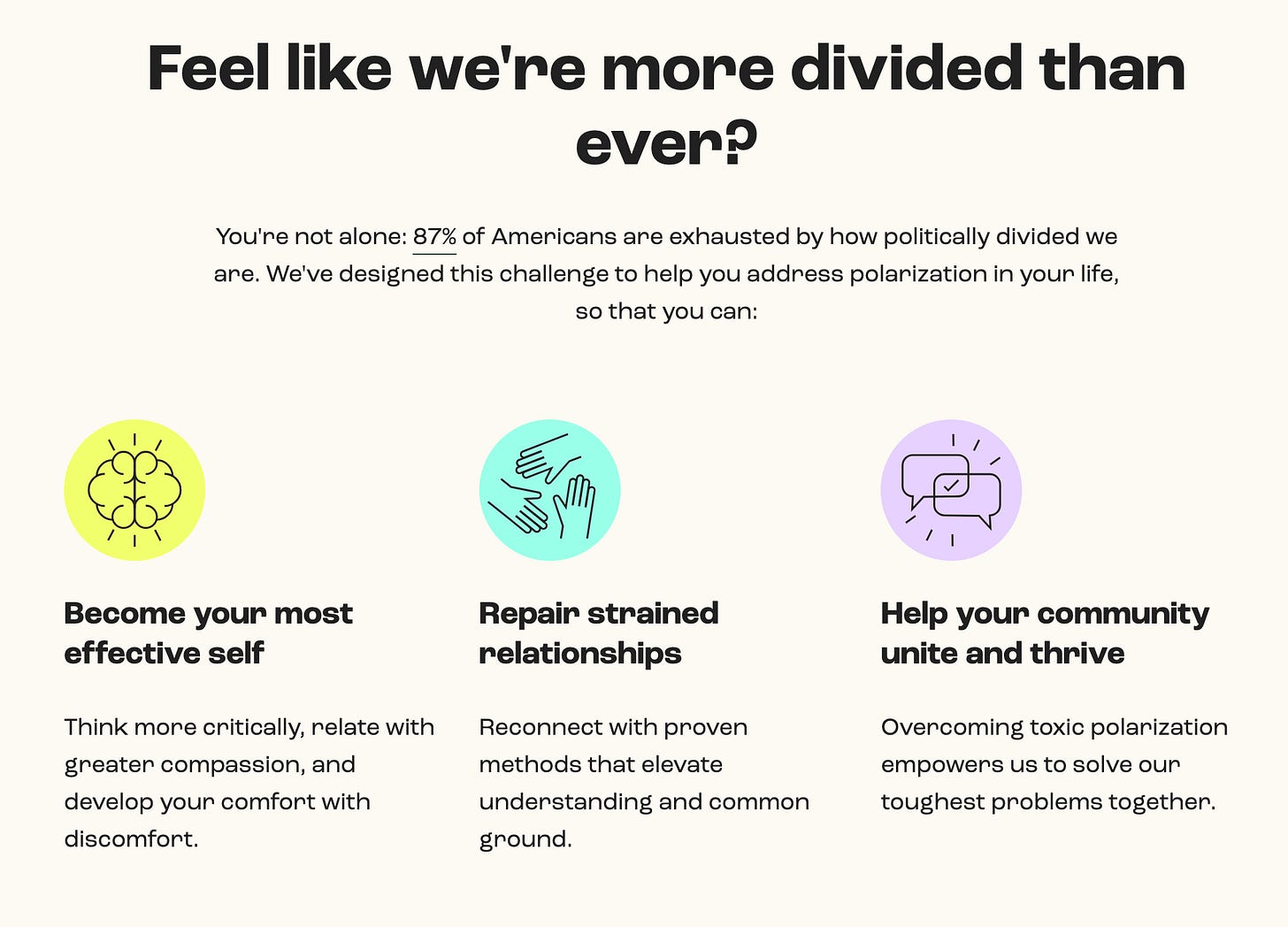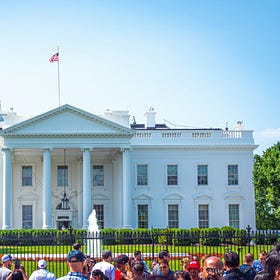How Business Can Do the Right Thing: An Interview with Alison Taylor
Issue 104: Alison Taylor provides a sneak peek into her new book about the landscape of ethical business in the 21st century
Our news feeds are full of stories about employee unrest over racial injustice, communities infuriated by corporate environmental impacts, staff anxious over employer surveillance, and discoveries of child labor in supply chains. Simply aiming to maximize shareholder value without breaking the law is no longer sufficient for effective organizational leadership. Yet there's widespread debate and confusion about what it truly means to do the right thing in business.
In her eye-opening book, Higher Ground: How Business Can Do The Right Thing in a Turbulent World, NYU Stern School of Business Ethics Professor Alison Taylor argues that amid stakeholder demands and transparency pressures, we can no longer treat ethics as a legal and reputational defense strategy.
Leaders at the Business Roundtable to Davos are urging a new corporate responsibility approach. However, implementing these ideas is challenging for organizations facing high expectations and widespread suspicion. In her book, Alison uses compelling stories to offer a blueprint on how leaders can rethink and reshape their practices in this complex and risky environment.
We included Alison in our short documentary and podcast and know her to be full of insight and provocative ideas (and she regularly shares fascinating content on LinkedIn). She previously explained to us that organizations and businesses have become more polarized, and c-suites have become either more Republican or more Democrat in the last decade. Therefore, we were excited to hear about her new book on how businesses can do the right thing in a turbulent world. You can pre-order the book here or purchase it on Feb 13th, 2024.
What does your book teach us about social identity or group dynamics?
My book aims to answer the question of what it takes to be a good business in the 2020s. That’s clearly a big question, and a lot to take on.
My main conclusion is that thinking of organizations as self interested black boxes or legal persons with singular interests is stopping us from designing more ethical and effective cultures. Instead, we need to reimagine organizations as social systems that shape and are shaped by their external environment. One of our problems is that our favored metaphors don’t reflect reality.
The book provides a framework for us to think about how to respond to a world where ethics, culture and values are in constant flux. Focusing on shareholder value and the law is no longer an option, but we are drowning in a cacophony of bad advice.
What is the most important idea readers will learn from your book?
First, readers will learn how to reshape ethical business efforts. Business and organizational leaders will learn how to move away from outdated tactics like treating “speaking up” as empty PR, or thinking “ethics” is just about not breaking the law. And, they will learn to connect the dots between the various confusing conversations going on out there about ESG, “speaking up”, a crisis in leadership, the emergence of culture as a source of strategic advantage, and rage over legalized corruption.
In summary, we can no longer treat “ethics” as a set of defense mechanisms aimed at defending the corporation from regulatory and reputational risk. This is not sufficient to be an ethical, successful business in the 2020s.
The new approaches introduced in the book are grounded in a business’ impact on its employees, consumers, the environment — and human beings in general. Finally, the book emphasizes that you need to recognize, own up to, and clean up your own messes as well as treat people with dignity and respect. If you don’t get these things right, but engage in empty grandstanding on issues of the day, you aren't practising “stakeholder capitalism”, you are just making everything worse.
Why did you write this book and how did writing it change you?
I wrote it because I saw a very siloed and confused conversation across the domains of compliance, HR, leadership and environmental, social and corporate governance. We've never been so confused about what it means to be a good business. Writing it was painful! But it also helped me clarify my ideas and make them accessible to the general business reader.
One thing that helped is that the questions I’ve been exploring for a long time have gradually become more mainstream. Ten years ago, it would have been difficult to anticipate just how enthusiastic corporations have become on “speaking up” on issues of the day. Now, many of my students don’t even remember the time when business was supposed to be “neutral” and they no longer view neutrality, or a laser focus on shareholder value, as viable and realistic for companies. There have been dramatic changes to this conversation over the last decade, and so one of the tasks I had was to explain those changes, where they came from, and what we might do about all the new pressures and risks that have opened up.
What will readers find provocative or controversial about your book?
I hope that all of it is both provocative and controversial! Chapter 2 of my book deals with common cliches, myths and tropes about responsible business and challenges them all. For example, I argue that you shouldn't try to "balance" stakeholder interests or manage reputational risk, because that’s not strategy, that’s impression management. I argue that transparency, which is often seen as the answer to everything is not the solution it is purported to be, and can lead corporations into obsessing over disclosure at the expense of action. I argue that strong “zero tolerance” commitments often do more harm than good.
Do you have any practical advice for people who want to apply these ideas (e.g., three tips for the real world)?
I think the overall imperative is to understand ethics as a dynamic process, and to involve employees in using their judgement, shaping ethical commitments and resolving dilemmas. Ethics isn’t about rules and prohibitions, nor is it about taking on problems your business can’t solve, it is a process of change.
That said, you aren’t a democracy, and your stakeholders aren’t an electorate. You need to be restrained and thoughtful about the problems you suggest you take on, and be much more rigorous about overpromising and exaggeration, not least because the public has a “gotcha” mindset and is focused on hypocrisy.
To a great extent, the way forward involves going back to basics, and focusing on trust, not reputation management:
Exercise practical curiosity about your impacts, and understand employees are your most important stakeholders.
Treat humans with dignity and respect.
Clean up your own mess before making more ambitious commitments.
News and Updates
Our friends at It Starts With Us and Peter Coleman (Director of the Morton Deutsch International Center for Cooperation and Conflict Resolution) recently developed a Polarization Detox Challenge where one action a day can help provide some relief from the effects of political polarization.
Let us know if you tried the challenge. Jay will be giving a talk on The Power of Us at the International Center for Cooperation and Conflict Resolution at Columbia University at 3pm on April 16th (Teachers College). He’ll be happy to share you experiences and feedback with Peter.
Learn more about THE POWER OF US
If you like our newsletter, we encourage you to check out our award-winning book “The Power of Us: Harnessing Our Shared Identities to Improve Performance, Increase Cooperation, and Promote Social Harmony”. You can learn more about the book or order it from the links on our website (here or scan the QR code below). We keep the newsletter free, but are extremely grateful if you have a chance to purchase the book or buy it for a friend this holiday season who wants to learn more about group psychology.
Catch up on the last one…
In a diverse world of friends, enemies, and strangers we explore how institutions help foster trust and social cohesion. (And what the declining confidence in institutions might mean for democracy).
How Institutions Can Create Social Cohesion
Dom and his former PhD student Nick Ungson just finished editing a special issue about “the psychology of social cohesion” for the journal Translational Issues in Psychological Science. With our outstanding team of associate editors, we were delighted to receive fascinating papers on complex relationships between social cohesion and volunteering,






